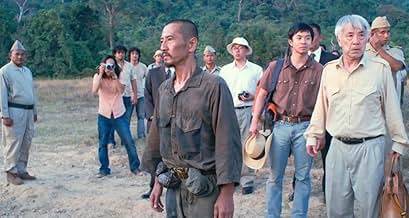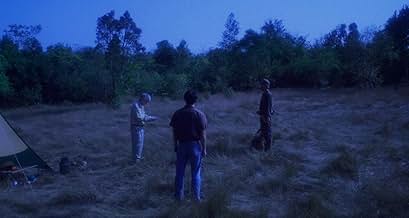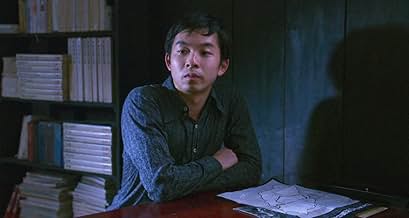Onoda
- 2021
- 2h 53min
CALIFICACIÓN DE IMDb
7.2/10
3.3 k
TU CALIFICACIÓN
Cuando Japón se rinde al final de la Segunda Guerra Mundial, el soldado Hiroo Onoda se retira a las selvas de Filipinas para continuar él mismo la guerra durante otros diez mil días.Cuando Japón se rinde al final de la Segunda Guerra Mundial, el soldado Hiroo Onoda se retira a las selvas de Filipinas para continuar él mismo la guerra durante otros diez mil días.Cuando Japón se rinde al final de la Segunda Guerra Mundial, el soldado Hiroo Onoda se retira a las selvas de Filipinas para continuar él mismo la guerra durante otros diez mil días.
- Dirección
- Guionistas
- Elenco
- Premios
- 5 premios ganados y 20 nominaciones en total
Yûya Endô
- Hiroo Onoda - Young
- (as Endô Yûya)
Kanji Tsuda
- Hiroo Onoda - Old
- (as Tsuda Kanji)
Yûya Matsuura
- Kinshichi Kozuka - Young
- (as Matsuura Yûya)
Tetsuya Chiba
- Kinshichi Kozuka - Old
- (as Chiba Tetsuya)
Shinsuke Kato
- Shôichi Shimada
- (as Katô Shinsuke)
Kai Inowaki
- Yûichi Akatsu
- (as Inowaki Kai)
Issei Ogata
- Major Yoshimi Taniguchi
- (as Issey Ogata)
Taiga Nakano
- Norio Suzuki - The Tourist
- (as Nakano Taïga)
Nobuhiro Suwa
- Tanejirô Onoda - Onoda's Father
- (as Suwa Nobuhiro)
Mutsuo Yoshioka
- Captain Hayakawa
- (as Yoshioka Mutsuo)
Tomomitsu Adachi
- Governor-General Shigenori Kuroda
- (as Adachi Tomomitsu)
Kyûsaku Shimada
- Lieutenant Suehiro
- (as Shimada Kyûsaku)
Jemuel Satumba
- Filipino Prisoner
- (as Jemuel Cedrick Satumba)
Ryû Morioka
- Student
- (as Ryu Morioka)
Akira Morita
- Extra
- (as Morita Akira)
- Dirección
- Guionistas
- Todo el elenco y el equipo
- Producción, taquilla y más en IMDbPro
Opiniones destacadas
In anticipation of the Allied landings on the Philippine island of Lubang, the Japanese send a small squad to engage in some guerrilla warfare activities pending the reorganisation of their own troops ready to return in due course. Amongst these men is the young Lt. Hiroo Onoda. He is an idealistic young man who firmly believes in his cause and is determined to do what he can, for as long as he can. Now what we know from the outset is that his nation surrenders in 1945, one year after these troops are deployed - but nobody tells Onoda. With his small squad still patrolling the island, their team begins to fracture. Their discipline to fail. The relentless monsoon rains; disease and the activities of the locals begin to reduce their number but he is adamant that he will stay on duty for as long as it takes - even if that takes us into the 1970s. Both Yûya Endô as the younger man and Kanji Tsuda as the older one play their parts convincingly as the story, based on real facts, illustrates the tough life amidst the dense jungle where they are seemingly abandoned by their own side and left to their own, limited, devices. The story mixes the timelines so we skip from young to older, and that's quite effective at breaking up the story to avoid it being just a straightforward chronology. It also uses the other characterisations to demonstrate the increasing frustrations of these men as personalities clashed and loyalties, and authority, is tested. As we proceed their's becomes more of a brotherhood than an army unit, and that makes the tragedies and misfortunes that befall them all the more poignant. It's history, so there isn't much latitude as to the denouement, but when we do get there it's quite a touching conclusion that seems just a bit rushed, but entirely fitting.
What a good surprise this film directed by a French and speaking of the war in the Pacific from the Japanese point of view. So unexpected and awesome in the same time. I could not believe that this young director is not under the influence of Clint Eastwood's LETTERS FROM IWO JIMA, John Boorman's HELL IN THE PACIFIC or Kon Ichikawa's FIRES IN THE PLAINS. Impossible for me to think that he would have never heard of those three iconic films. Back to this one, I don't know how anyone could say harm about it, except maybe a bit too long; yes, maybe. Plus, it speaks not only of the japanese soldiers, but not the kamikaze or simple fighters, but some kind of secret section of soldiers sent into a Philippines Island. The young director from France is also aware of the Mizoguchi's influence and with the poetic lines of the Japanese spirit. Good film to be watched at any cost. Only for this incredible but so authentic story.
The case of Onoda, a WW2 Japanese soldier who carried on fighting for thirty years on the Philippine island of Lubang before being persuaded to give up, was a celebrated case in the mid 1970s, and I was really impressed by this dramatic reconstruction of his life. It's a high quality movie, beautifully filmed, thoughtful, and well played all round, though I also thought it a bit too long at more than 2.5 hours. There are great performances all round and solid direction which almost has a David Lean approach at times (no bad thing), so it's a 'small scale epic' with a heart, and well worth a view. There are some supremely effective moments, and the film deserves a wider audience, though you do have spare quite a bit of time.
Although a little bit long, this is about offering us to share a rather unique and captivating life experience, that of brainwashed Japanese soldiers who only stopped the war 30 years after the capitulation. I appreciated the warm and moist beauty of the jungle and the tropical forest, the change of scenery provided, the sober image which seems authentic and of the period, the "film" aspect and documentary grain. Documentary also as long as there is no lady state. Innocent people go there. The story that is told to us is quite simply captivating and I would not have believed that this anecdote from History, which could be summed up in a few lines, could fit into such a great film. With hindsight, however, I can understand that it does not please some who would fall into boredom; with this film it's a bit all or nothing, you have to succeed in immersing yourself. It is a French film, and as such it must be emphasized that it is a nugget.
Greetings again from the darkness. There has been no shortage of conspiracy theories, either recently or historically, that have left non-believers bewildered at how 'the other side' held firm. Writer-director Arthur Harari and his co-writers Bernard Cendron and Vincent Poymiro bring the remarkable struggle of Hiroo Onoda to the screen. Onoda was a Japanese soldier who refused to believe WWII ended, and instead, continued his mission of resistance by spending thirty years in a Filipino jungle.
Onoda was only 22 when he entered the war in 1944. He is played as a young man by Yuya Endo, and in later years by Kanji Tsuda. The film goes mostly in chronological order, with only occasional flashbacks to Onoda's "special training" by Taniguchi (Issey Ogata), his trainer and trainer. The passing of years is noted on screen, and we watch as Onoda's squadron shrinks in size, holding at four for quite a while, before shifting to two, and finally only he remains. During the special training, Taniguchi declares, "You don't have the right to die", instilling a firm commitment to the cause in Onoda.
Also seared into Onoda's brain is the proclamation of, "We'll come back for you. No matter how long it takes, we'll come back for you." Still, it's fascinating to see his determination to keep fighting, despite so many signs that the war was over. He viewed magazine articles and radio broadcasts as tricks to draw him away from his mission ... going so far to decipher a coded message that was anything but that.
The young man who finally succeeds in lulling Onoda out of the jungle has his own mission - actually three of them: finding a panda, locating Onoda (by this time a legend), and tracking down a Yeti. It's a bittersweet moment for the long-dedicated soldier, and he went on to live many more years as a home country icon - considered a nationalist man of honor by some, a murdering fool by others. The film, and Onoda's saga, makes us question the point of war when it's impossible to tell if the war is over or ongoing. Harari's film is almost three hours, which is entirely too long ... but significantly shorter than the time Onoda spent in the jungle.
Releasing in theaters on October 14, 2022.
Onoda was only 22 when he entered the war in 1944. He is played as a young man by Yuya Endo, and in later years by Kanji Tsuda. The film goes mostly in chronological order, with only occasional flashbacks to Onoda's "special training" by Taniguchi (Issey Ogata), his trainer and trainer. The passing of years is noted on screen, and we watch as Onoda's squadron shrinks in size, holding at four for quite a while, before shifting to two, and finally only he remains. During the special training, Taniguchi declares, "You don't have the right to die", instilling a firm commitment to the cause in Onoda.
Also seared into Onoda's brain is the proclamation of, "We'll come back for you. No matter how long it takes, we'll come back for you." Still, it's fascinating to see his determination to keep fighting, despite so many signs that the war was over. He viewed magazine articles and radio broadcasts as tricks to draw him away from his mission ... going so far to decipher a coded message that was anything but that.
The young man who finally succeeds in lulling Onoda out of the jungle has his own mission - actually three of them: finding a panda, locating Onoda (by this time a legend), and tracking down a Yeti. It's a bittersweet moment for the long-dedicated soldier, and he went on to live many more years as a home country icon - considered a nationalist man of honor by some, a murdering fool by others. The film, and Onoda's saga, makes us question the point of war when it's impossible to tell if the war is over or ongoing. Harari's film is almost three hours, which is entirely too long ... but significantly shorter than the time Onoda spent in the jungle.
Releasing in theaters on October 14, 2022.
¿Sabías que…?
- TriviaWhilst set on a remote Philippines Island the film was in fact shot on location in the kingdom country of Cambodia.
Selecciones populares
Inicia sesión para calificar y agrega a la lista de videos para obtener recomendaciones personalizadas
- How long is Onoda: 10,000 Nights in the Jungle?Con tecnología de Alexa
Detalles
- Fecha de lanzamiento
- Países de origen
- Sitios oficiales
- Idiomas
- También se conoce como
- Onoda: 10,000 Nights in the Jungle
- Locaciones de filmación
- Bokor National Forest, Cambodia(jungle)
- Productoras
- Ver más créditos de la compañía en IMDbPro
Taquilla
- Presupuesto
- EUR 4,530,000 (estimado)
- Total a nivel mundial
- USD 262,276
- Tiempo de ejecución
- 2h 53min(173 min)
- Color
- Relación de aspecto
- 1.85 : 1
Contribuir a esta página
Sugiere una edición o agrega el contenido que falta


























